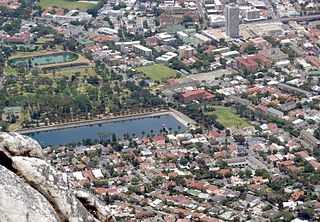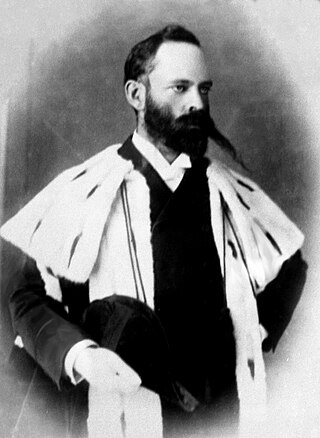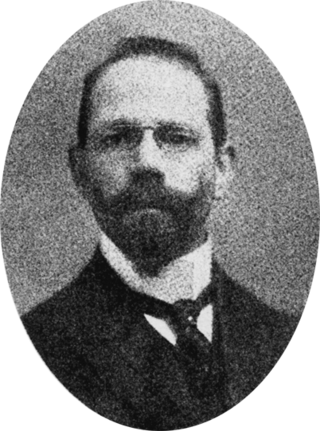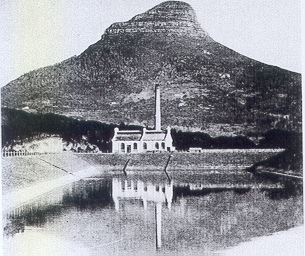
Cecil John Rhodes was an English mining magnate and politician in southern Africa who served as Prime Minister of the Cape Colony from 1890 to 1896. He and his British South Africa Company founded the southern African territory of Rhodesia, which the company named after him in 1895. He also devoted much effort to realising his vision of a Cape to Cairo Railway through British territory. Rhodes set up the Rhodes Scholarship, which is funded by his estate.
Howard Unwin Moffat served as second premier of Southern Rhodesia, from 1927 to 1933.

Oranjezicht is a suburb in the City Bowl area of Cape Town, South Africa. It was built on the site of the old Oranjezicht farm, which used to stretch at least as far as the Mount Nelson Hotel and supplied the Castle of Good Hope with fresh produce.
Graaf or Graaff may refer to:
Gavin Relly was a South African businessman and former chairman of Anglo American.

Sir David Pieter de Villiers Graaff, 1st Baronet was a South African cold storage magnate and politician. Graaff revolutionized the cold storage industry in Africa. He founded the Imperial Cold Storage and Supply Company in 1899, and aggressively ran it until he left to serve in government. Graaff grew the company into one of the largest in Africa. Graaff's wealth soared, at the turn of the century. During World War I he personally part financed the South African war effort and for this he was knighted as well as for services at the Paris Peace Conference 1919.

Villiersdorp is a town of approximately 10,000 people located in the Western Cape province of South Africa in the Overberg region.

Sir John Charles Molteno was a politician and businessman who served as the first Prime Minister of the Cape Colony from 1872 to 1878.

Tiger Brands Limited is a South African packaged goods company. In addition to the company's South African operations, Tiger Brands has direct and indirect interests in international food businesses in Chile, Zimbabwe, Mozambique, Nigeria, Kenya, Lesotho and Cameroon. Tiger Brands is South Africa's largest food company.

The Molteno Brothers, Edward (1877-1950) and Harry (1880-1969) Molteno, were sons of Cape Prime Minister John Molteno by his third wife Sobella Maria. Pioneering and successful exporters, they had a huge influence on South Africa's fruit industry.

Elizabeth Maria Molteno, was an early South African British activist for civil and women's rights in South Africa.

Johannes de Villiers Graaff was a neoclassical South African welfare economist. Graaff is noted for his work on optimal savings rates, contributions to the creation of the social welfare function and for his 1957 magnum opus Theoretical Welfare Economics.
Panorama is a suburb in Parow, Cape Town, South Africa.

Molteno Dam is a small but historic dam, on the lower slopes of Table Mountain in Western Cape, South Africa. Still in service, it was established in 1877 and is now located in the suburb of Oranjezicht, Cape Town.

Sir Jacobus Arnoldus Combrinck Graaff, also known as 'Sir James', was a South African cabinet minister, Senator, businessman, and South African Party whip.
Susman Brothers was a business partnership that united brothers Elie Susman and Harry Susman after they crossed the Zambezi river in 1901. The brothers were Jewish businessmen from Rietavas, western part of Russian Empire, now Lithuania. They founded, owned, and operated several large businesses in Africa. Elie Susman, the younger of the two, was the founder of Susman Brothers. However, it was not until 1907 that the business name of "E. Susman" was changed to "Susman Brothers".

De Villiers Graaff High School is an academic state secondary school in Villiersdorp, a small town approximately 150 km from Cape Town, South Africa. It was founded in 1872 and is also known by the acronym "DVG".

The Fray Bentos food brand is associated with tinned processed meat products, originally corned beef and later meat pies. The brand has been sold in the United Kingdom, other European countries, and Australia. Created in the second half of the 19th century, the name is derived from the port of Fray Bentos in Uruguay where the products were originally processed and packaged until the 1960s. The brand is now owned in the UK by Baxters, which manufactures the product range in Scotland. Additionally, the Campbell Soup Company manufactures and sells Fray Bentos branded steak and kidney pies in Australia.

James Bisset was an architect and civil engineer of the Cape Colony, responsible for many of the Cape's early buildings and communications infrastructure. He was also Mayor of Wynberg, South Africa.

The Graaff Electric Lighting Works power station is a decommissioned Hydro-electric and steam power plant located in Cape Town, South Africa at the site of the Molteno Dam.
















